“An interdisciplinary web portal for reflection, critique and documenting contemporary Portuguese-speaking African cultures” is how Buala is introduced. In an interview with Global Voices, Buala’s creators Marta Lança and Francisca Bagulho discuss the grounds and justification for a space that grapples with culture, history, politics, the arts in general and the city – the space par excellence of “constant change,” the living stage for playing out contemporary culture.
In 2010, two Portuguese women with years of experience in cultural production in Africa launched a “comprehensive project,” “[spreading] the will expressed by various African creators of culture,” which lead to their “discovering many other [creators of culture].” They introduced the project in Maputo, Luanda, studied Cape Verde and Portugal, opened a cultural association, secured seed money to start up operations and began collecting articles “in which quality and a certain thematic balance are essential.” “Subsequently, our job has been to maintain this same level of interest on a daily basis.”
So, they launched this “independent space” – Buala, a “place for long, in-depth articles that focus on serious, complex works that do not dispense with irony and with the urban cultures of an African youth and an African youth in the Diaspora that has much to say, with people who study Africa without historic blind folly and fantasy, who wish to contribute to reflections on (and with) the continent.” The site is available in Portuguese, French and English and is geared toward an international audience that may be getting to know contemporary Luso-African cultures and experiences for the first time. Yet, because it “seeks to foment mutual understanding and build bridges,” Buala is essentially bidirectional.
Because Buala establishes the text- and image-based contributions it receives as its geography, the web site visitor gets the sensation that all of Africa (not just Portuguese-speaking Africa) becomes lost in the world when it leaves its continental geographic limits. “The African continent is historically a continent of migrations. The impact of the slave trade to the Americas, of the late decolonization, is reflected in cultural and social frameworks that cut across various geographic contexts and that are worthy of discussion and reflection.”
Contemporary Africa is thus understood in transnational context.

Bwala, from the North Mbundu language, means house, village, a community where encounters occur. The orthographical shift to Buala was not for visual purposes, rather “to not focus solely on a specifically Mbundu word since we work within a more international context.”
Global Voices Online: Tell us about the Buala project. How did the idea emerge?
Buala: The idea arose from our noticing that there was a paucity of recording and exposure of interesting and current cultural happenings in Africa and in the African Diaspora that were not laden with the nostalgia or unilateral perspectives that had dominated the cultural scene for so many years. Moreover, we felt that the production of knowledge concerning Africa was not reaching the countries of Africa nor was knowledge circulating as it should among those most involved in its production. There are many topics, people, cultural phenomena that merit in-depth articles and that lack channels for dialoging and for cultural exchange among members the Community of Portuguese Language Countries (CPLP in Portuguese) and between members of the CPLP and the rest of the world. We thought the internet would be the most far-reaching tool to extend and expand all of this potential for exposure and dialogue, especially among the youth; we currently get 500 readers a day without incurring heavy costs.
GVO: In addition to the thematic diversity of the articles posted on Buala, there is a very notable presence of the Portuguese language, of Lusophone culture…
B: The Lusophone factor, widely disseminated in terms of discourse throughout all the Portuguese-speaking countries, does not mean an integrated awareness of these countries’ realities and cultures. Buala seeks to bring these people together to dialogue, but we do not wish to fall into that trap of Lusophone discourse, and certainly not emanating from Portugal, which frequently reverberates the past. Many people visit this space; we share a common language and realities that interconnect; we feel at home in any of these countries, but truthfully there is no overarching mutual understanding nor any notable self-promotion among the countries.
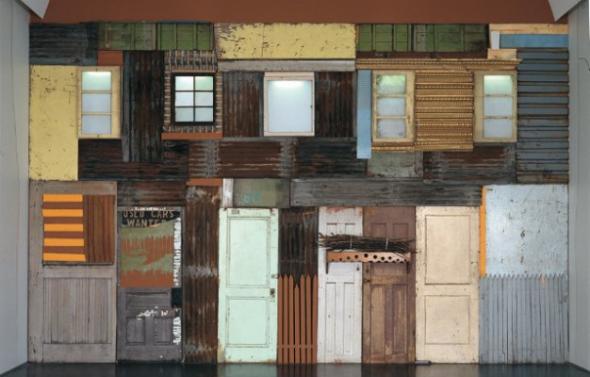
"It is important to communicate with the dynamic natures of the Portuguese-speaking counties and their particular features, to reinforce their unity, but not to treat at their unity as a homogeneous block." Image: Antonio Ole in an article entitled "Lusophone culture, identity and diversity in web society"
The fact that we have general and particular view of these countries – of their frustrations and irritations, their trends, dependencies and desires, their cultural practices and the figures who comprise the cultural panorama of each, and precisely because we believe that there is a new generation that can live these realities by weaving in other elements and by internalizing and expressing a decolonized point of view, made us see the advantage of dialoging on the various perspectives in the interest of sharing.
It is with these new perspectives and new peaks that we are interested in working, in a demystified manner, without excluding a post-colonial approach in our analysis of past relations to understand those of the present. We are trying to revert the tendency of a “space for Portuguese language” as an isolated bubble separate from the rest of the world. We are interested in contributing to Portuguese-speaking countries’ observing and participating in what is happening in the rest of Africa, which sometimes does not happen; for example, Angola and Cape Verde communicate much more with Brazil and Portugal than with the rest of the countries of Africa. We could say the same about Africa’s and the world’s scarce interest in these countries as strong participants in the creation of culture.
On a linguistic level, we are interested in delving into the diversity of the Portuguese language, showing the variety of expressions, slang, lexicon, and variants of the language through Portuguese’s transformative capacity. We invite Mozambican, Brazilian, Angolan, Cape Verdean, Portuguese authors, and their way of writing enables us to understand the thinking and culture of their countries and reference points or, in the case of people who have may have one foot in more than one country, of the mix produced from the “constant Diaspora.” Many African authors and creators adhere to Buala as they see themselves part of an attempt to bring more visibility to good works that encourage youth to pursue the elements necessary for critical thinking.
GVO: Who composes Buala’s readership? Are you looking to expand this readership base?
B: Buala is an interdisciplinary web portal for reflection, critique and documenting contemporary Portuguese-speaking African cultures. We noticed there were similar projects in French, English, German, etc., but only minimal material published in Portuguese. Those projects include a special focus on French-speaking and English-speaking African countries and a dearth of articles on Portuguese-speaking African countries. We are interested in providing a current platform for articles that reflect and critique this contemporary culture within a “Portuguese-language space” and to do so in a way that is integrated and contextually connected to the reflections emerging from other countries and other authors. Thus, Buala proposes, on the one hand, to provide reflections and to translate them, for the time being, into French and English – the languages that seem to us the most important and most viable for translation – and, on the other hand, to translate into Portuguese some of the most relevant discussions on contemporary African culture.
This component of translation undoubtedly allows us to better disseminate knowledge of the articles written and the topics discussed at the international level. While it is always interesting to increase readership, currently it is not possible to expand the languages into which we translate our articles, and we believe that the three languages already provide significant scope.
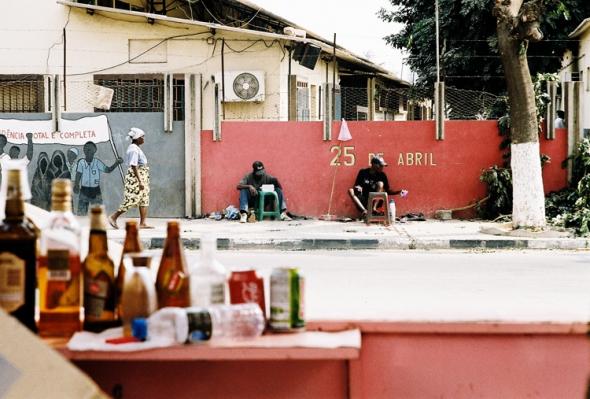
Buala proposes “to create new views, free from prejudice and colonial judgment.” Photo: Sérgio Pinto Afonso in an article entitled “Luanda, a state of urgency” by Marta Lança
GVO: Is the Portuguese-speaking community in African countries still under construction, compelled to articulate its need for decolonization? Or would it be a contradiction to talk of Lusophone culture and decolonization, considering that the Portuguese language in Africa is a colonial legacy, the result of a colonialist process that was once called “civilizing”? To what extent has contemporary Africa been questioning this?
B: In the first place, it is indeed important to reflect on the meanings of this “community under construction, positively under construction and positively rejected at times, since there are many possible identities within these countries in addition to this feature of the Portuguese language (which also should be viewed in country-specific context). We have published various articles on Buala that take new approaches to question the concept of Lusophone culture, that seek out these cultural identities shared among the countries, that draw comparisons to other models of linguistic, economic and cultural spaces, for example the Francophone sphere (in terms of cultural endeavors cultural and identification it is entirely different), and that pursues aspects that merit development in within this community.
We are well aware of this very dangerous “civilization” attribute that existed in colonial times and that remained in peoples’ minds for so long due to the manipulated idea of exception from Portuguese colonialism, couched in Luso-Tropicalia and other palliative theories. Lusophone culture depends on the narration of this certain history of Portuguese colonization, which justifies a certain present; for this reason we must recount alternative histories, expand our references and publish anti-colonial texts from resistance fighters, Negritude thinkers and leaders of the independence movements, from poets and philosophers and the entire cultural atmosphere of this period, from a perspective that is not only historic, but reflects on the current reality and that expresses the artistic views that subverts and takes new angles on old myths.
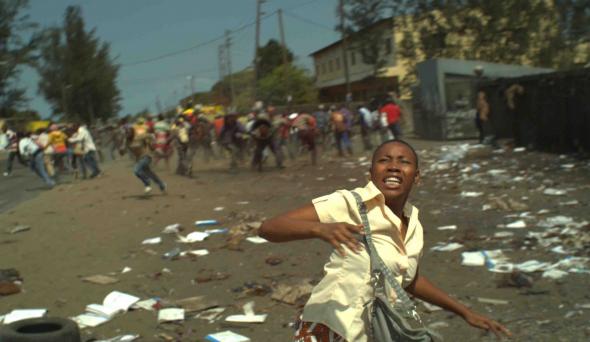
Image from the motion picture Mahla, by Mozambicans Mickey Fonseca and Pipas Forjaz, in the Buala blog “Dá Fala” (Giving Voice, pt), on African contemporary culture
Lusophone culture sometimes runs the risk of being this cover up of a violent past, a political correctness with the rhetoric of heady interculturality, which gives us the sensation of being in a space truly concerned with the fundamental questions of how to live with the Other. It is hypocritical when we know that there is still so much racism, and it is important to stress that this is not exclusive to Portugal. In Cape Verde, there is deep-seated racism against people from the African coast. In Angola, racism is directed towards the Congolese and the eternal poorly resolved questions between whites, blacks and mulattos. In Mozambique, complete dependence on foreign aid and neighboring markets provokes crises and desperation, like what we saw in September. São Tomé & Príncipe and Guiné-Bissau remain so unknown and urgently need greater cultural affirmation and positioning in the artistic sphere. Brazil exports its Brazilian culture to the entire world but is largely unfamiliar with the other Portuguese-speaking countries. Given the respective locations and preferential trading, these countries have other connections that also interest us.
Thus, aside from points of contact due to history and common migrations to/from these countries, we refuse to consider “Lusophone culture” as a single set, a sole block of countries. We believe in unity to strengthen the language and cultural exchanges, unity that needs to be better promoted (supporting more study grants and artists in residence, making the circulation of art/culture and the movement of peoples less bureaucratic, divesting ourselves of certain prejudices), but always taking into account the specific nature and diversity of each country. The internationalization that Buala seeks to create a space where Portuguese-speaking African countries are not hostage to the constraints of the dominant figures in each capital, to the cultural elite, to the lack of constructive criticism and opportunities for new voices to emerge. We are trying to move in the direction of expanding these biased and faulty visions with a more intergenerational, interdisciplinary and transnational approach.
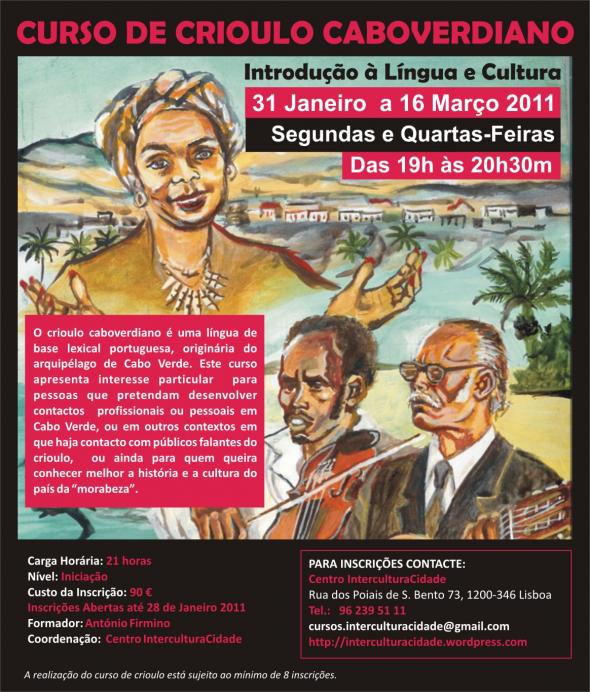
Poster from a Capeverdean Creoule language course promoted in the Buala blog “Dá Fala” (Giving voice, pt), on African contemporary culture
Contemporary Africa flies in the face of the paternalistic views that have been the dominant trend in artistic production concerning Africa. We prioritize the new African generations that, despite having been beaten back by conflicts and wars in their particular countries, are less bound to a mentality of repression, that bring other experiences and ways of thinking and dreaming to the table. Children of the generation of nationalists and independence fighters have made this legacy a reference in their own fights, with the numerous challenges of the present. Africans who live abroad and maintain a connection to the continent, reflecting and positioning themselves in interesting ways. Contributions from various non-African writers who propose to take on Africa without the overtrod narratives of the past, in contact with the world in which they live, cosmopolitan cities, with genuine and expressive curiosity.
If the African countries, under construction and facing many privations – filled with opportunists, from the local government to foreign interests, eternal accomplices in underdevelopment – do not place their bets on culture and education, they will not take the basic steps for a veritable show of strength among equals. Buala seeks to contribute to this qualitative jump with the tools at its disposal and to promptly create a meeting and discussion space accessible to all.

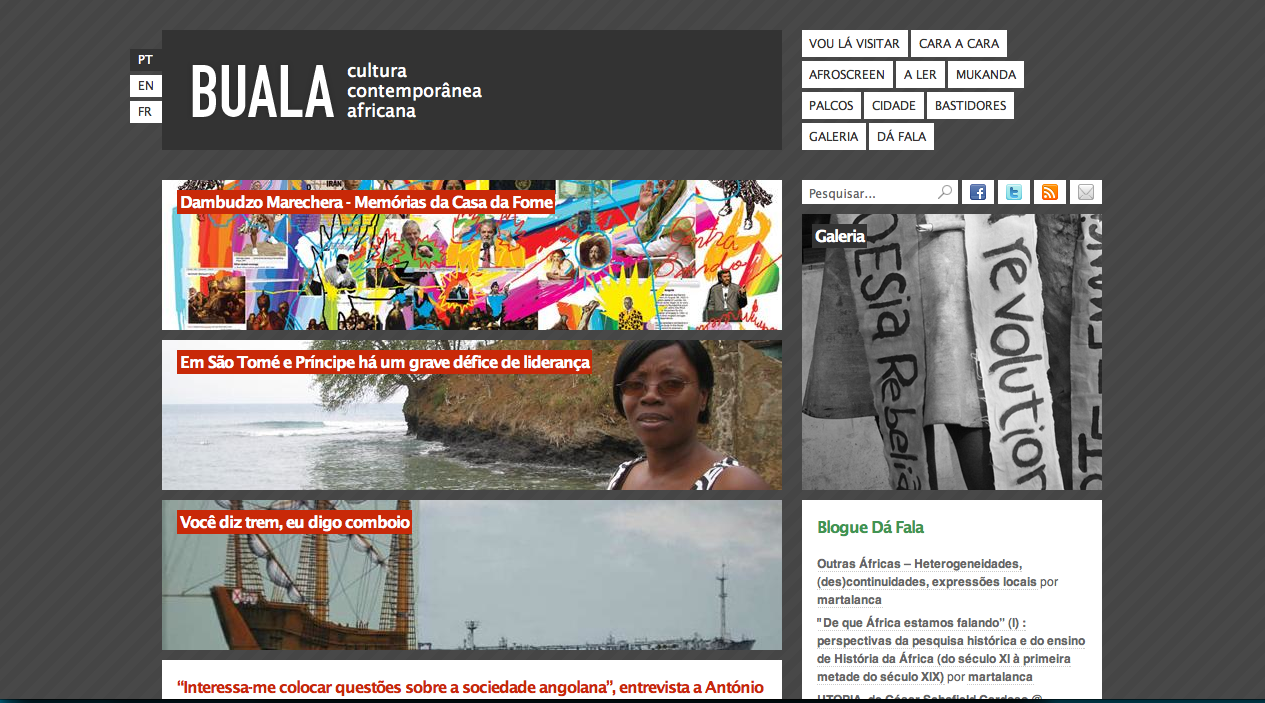






2 comments